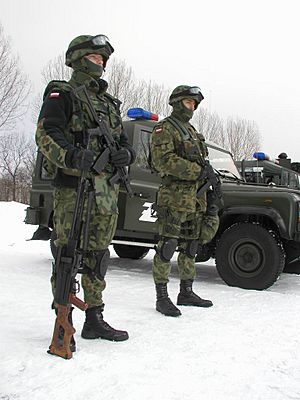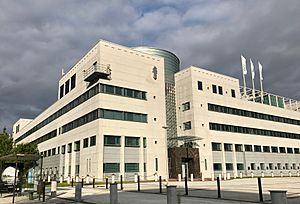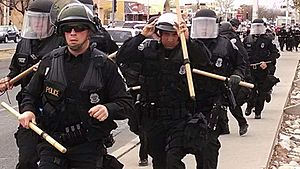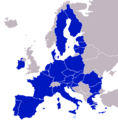Law enforcement agency facts for kids
A law enforcement agency, or LEA, is a government group in charge of making sure people follow the laws. They do this by hiring and using law enforcement officers, often called police officers.
The most common type of LEA is the police. However, there are many other kinds of agencies. Some focus on specific types of crimes, while others are managed by different authorities. These agencies have special powers, like the power of arrest and the right to use of force, to help them do their jobs.
Contents
What is Jurisdiction?
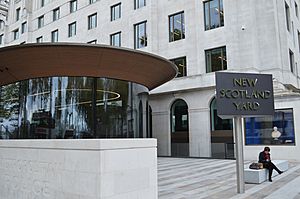
A law enforcement agency's power is usually limited to a specific area or a certain type of law. This area of control is called its jurisdiction.
Area of Operation
Most of the time, an agency's jurisdiction is a geographic area.
- National: Some agencies, like the National Police in France, cover an entire country.
- State or Province: Others, like the Ontario Provincial Police, are in charge of a single province in Canada.
- County or City: Many agencies, like the Miami-Dade Police Department, police a specific county or city.
- International: Some groups, like Europol, work across several countries in the European Union.
Sometimes, an agency's jurisdiction depends on the type of crime. For example, in the United States, the United States Postal Inspection Service investigates crimes related to the mail, like mail and wire fraud. If they found someone was smuggling tobacco, they would call in the Bureau of Alcohol, Tobacco, Firearms and Explosives, because that is part of their jurisdiction.
Levels of Law Enforcement
In many countries, there are several levels of law enforcement that work together. The United States, for example, has five main levels:
- Federal: Agencies that enforce laws for the whole country.
- State: Police who patrol a specific state.
- County: A sheriff's office that covers an entire county.
- Municipal: Local police departments for a single city or town.
- Special: Police for specific places like airports, subways, or tribal lands.
These different levels often have overlapping areas but usually focus on their own duties. For instance, the Chicago Police Department patrols the city of Chicago. The Cook County Sheriff's Office covers all of Cook County but mainly patrols areas outside the city and runs the county jail. The Illinois State Police patrols the state highways. They can all help each other when needed.
Police Stations and Beats
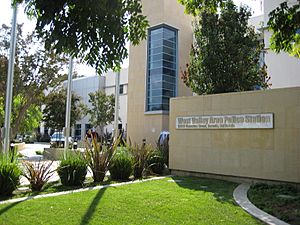
To manage a large area, an agency often divides its jurisdiction into smaller operational areas. These are sometimes called commands, divisions, or precincts. People often call a police officer's patrol area a beat.
For example, the New York City Police Department is divided into 77 precincts. Each precinct is responsible for policing a specific neighborhood in the city.
Types of Law Enforcement Agencies
There are many different kinds of law enforcement agencies, each with its own special job.
Federal and National Agencies
When an agency's jurisdiction covers the whole country, it is usually a federal or national agency.
Federal Agencies
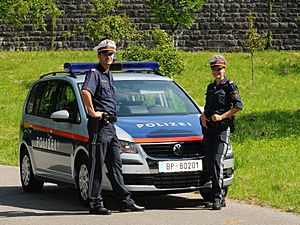
In countries with a federal government, like the United States, Germany, or Australia, a federal law enforcement agency handles laws that apply to the entire nation.
Federal agencies often deal with issues like immigration, border control, protecting national leaders, and investigating crimes that cross state lines. Examples include the Federal Bureau of Investigation (FBI) in the U.S. and the Australian Federal Police.
In a federal system, each state or division usually has its own police force for local laws. Federal agencies handle federal laws, but they can work with local police on big cases.
National Agencies
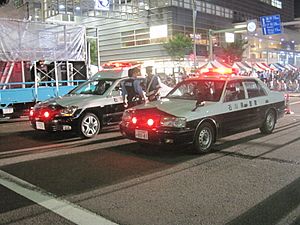
In countries that do not have separate states making their own laws, a national law enforcement agency is responsible for the whole country. These agencies handle both national and local policing.
Examples of countries with national police forces include New Zealand, Italy, Japan, and France. These forces are often divided into regional or local units to manage their duties effectively.
State and Local Police
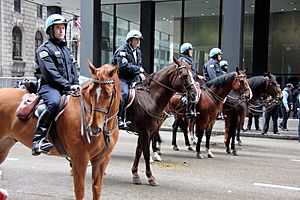
In federal countries, state police or provincial police enforce laws within a specific state or province. They often patrol highways and help local police departments when needed.
Local police departments and sheriff's offices are responsible for law enforcement in a single city or county. They are the officers most people see in their communities every day. They respond to emergency calls, patrol neighborhoods, and investigate local crimes.
Military Police
The military also has its own law enforcement units, known as military police (MPs) or provosts. Their main job is to enforce laws and rules within the armed forces.
In some countries, there are also military-style police forces, called gendarmerie, that police the civilian population. These groups are part of the military but do police work.
Other Kinds of Agencies
Not all law enforcement is done by the police. There are other types of agencies with special roles.
- Regulatory Agencies: These groups make sure that businesses and people follow specific rules, like building codes or environmental laws.
- Private Police: Some companies or organizations hire their own police to protect their property. For example, many large railroad companies have their own police forces to protect their tracks and trains.
- Religious Police: In a few countries, there are agencies that enforce religious law. These are often called religious police.
- Internal Affairs: Most police departments have an internal unit to investigate their own officers and make sure they are following the law correctly.
Special Powers of Law Enforcement
To do their jobs, law enforcement agencies are given special powers that ordinary citizens do not have. These powers are usually controlled by laws and the courts to make sure they are not misused.
Some of these powers include:
- Collecting information about people.
- Searching for evidence of a crime.
- Seizing property that was used in a crime.
- Arresting and detaining people who are suspected of breaking the law.
In some cases, officers may need to get a search warrant from a judge before they can search someone's property. This means they have to show evidence that a crime has likely been committed.
Sometimes, to catch people who are breaking the law, officers are allowed to work in secret. This is often called an undercover or covert operation. They might use a fake identity or pretend to be part of a criminal group to gather evidence. These types of operations have very strict rules.
Images for kids
-
A map showing the different police force areas in England.
-
A Camden County Police Department vehicle. This department was formed in 2013 to police Camden County, New Jersey.
See also
 In Spanish: Fuerza de seguridad para niños
In Spanish: Fuerza de seguridad para niños
- List of anti-corruption agencies
- Code enforcement
- List of law enforcement agencies grouped by sub category
- List of protective service agencies
- List of secret police organizations
- List of specialist law enforcement agencies
- Outline of law enforcement
- Specialist law enforcement agency
- Traffic police
- State police
- Sheriff
- Police
- Police foundation
 | Aaron Henry |
 | T. R. M. Howard |
 | Jesse Jackson |


